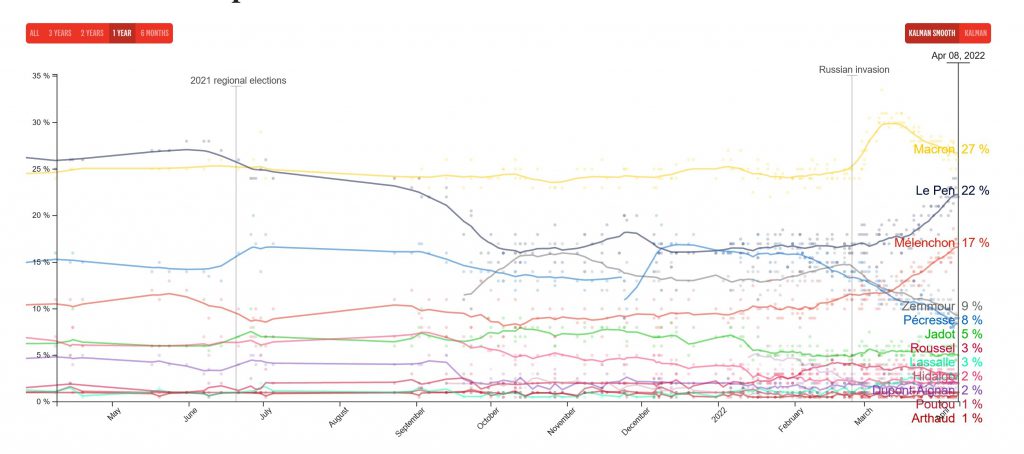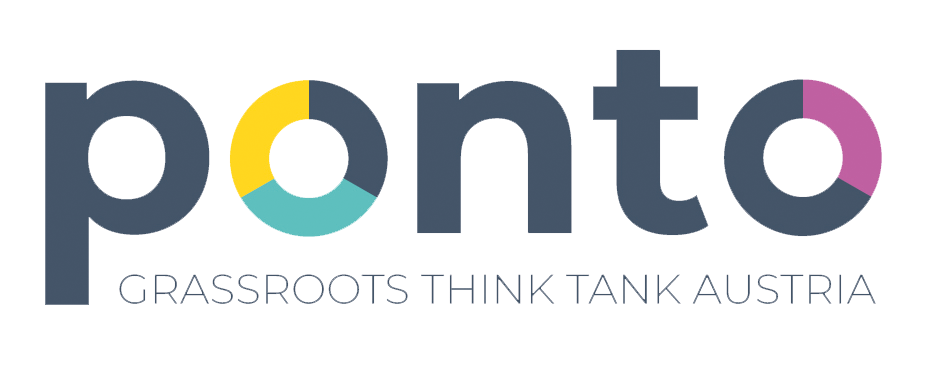
On April 10, 2022, presidential elections will be held in one of the most influential countries of the European Union: France. Nevertheless, new challenges such as migration have gained importance in recent years. On the French political agenda, this topic has become a hotly debated issue. During the election campaign, two right-wing candidates have set very clear limits on their migration agenda. With the use of stigma, they have tried to convince the fragmented voters. However, the results of this poll will not only influence national politics, but also the European Union as a whole.
The French presidential election of April 2022 is looming on the European agenda. Only some days away from the election, the surveys show that the French Left seems extremely vulnerable because of its fragmentation, giving a precious opportunity to the French Right to win (see fig.1). Two new right-wing candidates have entered the political arena; Valérie Pécresse and Éric Zemmour. Both contenders’ agendas have rested upon the presence of migrants in French territory, as well as the stigmatization of this group. Throughout the article, I analyzed the narrative of both candidates’ agendas by comparing interviews and speeches on the topic of migration. Then, I evaluated the importance of stigma and stigmatization in both candidacies, and how it has helped to improve their popularity. In the following section, the candidates’ agendas in terms of migration will be examined in detail.

Figure 1. France – 2022 presidential election. Percentage of votes drawn by the totality of the candidates. (Survey by: Arnau Busquets for « POLITICO ». Accessed April 7, 2022 in https://www.politico.eu/europe-poll-of-polls/france/).
A narrative built upon migration
In both political campaigns, the subject of migration has been tackled, as it has become one of the most debated issues in contemporary French politics. Both Pécresse and Zemmour are eager to diminish the number of people who have access to the French territory, claiming that today’s situation has had negative impacts on the country. They have also criticized the measures the government has taken as insufficient. Their agendas and plans to put their initiatives into action are, however, divergent.
Éric Zemmour has been characterized by his harsh views on the topic. The candidate of the Reconquête! Party, who has been accused of hate speech, wants to stop the migrant flow entirely, especially when talking about civilizations that are alienated from France and its history. He wants a French France, not a country constituted mostly by immigrants. He has openly expressed that he will be ready to close all borders if necessary, often defying constitutional limits. During his first campaign meeting, he explicitly announced that he would “remove all social assistance for non-European foreigners”, and that, in case he was elected president, during the first week of his administration “he wants to top the migratory flows and limit the right to asylum to a small number of individuals each year”. He made clear that the asylum applications should be made in French embassies abroad to “avoid the settlement of the homeless who never leave”. Finally, he wants to “remove the right to family reunification”, which would clearly contradict with EU law.
Even if the candidate for Les Républicains, Valérie Pécresse, is not considered as extreme in terms of migration, she has referred negatively to foreigners in French territory. She has claimed various times that there is a clear link between immigration and the rise of violence and delinquency. She also announced that she has the intention to reduce social assistance to asylum seekers and beneficiaries of family reunification on French territory. Her migration plan has been concretely presented as a constitutional bill to stop uncontrolled immigration. The bill’s main foundation, which will be launched if she is elected president in 2022, is to “introduce maximum annual immigration limits: each year the French Parliament will vote on maximum quotas of visas and residence permits. When the annual limit is reached, no more visas nor residence permits will be issued until the next year”.
In addition to this measure, there is the renegotiation of migration agreements with countries outside the European Union. These negotiations encompass new conditions for obtaining a residence permit such as “sufficient resources, mastery of the French language and respect for the values of the Republic”. Along these conditions, social benefits for non-French citizens are subject to five years of regular residence in France. Future asylum applications must be submitted in French embassies around the world before moving into French territory. Once accepted with this status in the country, they will be denied any social benefits. Foreigners who have served a prison sentence in France will be deported to their country of origin. Unaccompanied minors who seek asylum will have to undergo a physiological examination to determine their age. This plan of action was shared by Pécresse’s campaign manager, Patrick Stefanini, to the French newspaper Le Figaro.
How has stigma shaped the campaigns?
To understand how these policies can impact the electorate, it is useful to analyze the impact of stigma in both campaigns. In Rebecca Adler-Nissen’s text, Stigma Management in International Relations, she quotes Erving Goffman, an American sociologist, who explains that “stigma can be used to refer to any attribute that is deeply discrediting and incongruous with our stereotype of what a given type of individual should be”. Stigma uses the division of “us” and “them”, adopting an “other against which the self is constructed”. This notion comes hand in hand with discrimination and loss of status, as a specific population or feature is seen as “unwanted” and “out of the norm”.
In the case of the 2022 electoral campaign, stigma and stigmatization have been used to play with the electorate’s emotions. By targeting a specific group (in this case migrants) and creating a scapegoat (which is used to blame as the origin of all problems), the candidates call for unity to fight against this “threat”. The clear difference between “us”, the real citizens, and “them”, the outsiders, opens new possibilities to unite voters to reach a common goal. By building a campaign using the contested effects of migration, a sentiment of crisis could arise, pushing the electorate to vote for measures to protect them from this made-up antagonism.
When creating a fake antagonism between migrants and nationals, the candidate seeks to target the groups that stigmatize his supporters. A clear example is the controversial video in which Zemmour announced his campaign during the last days of November. With phrases such as “you feel like foreigners in your own country. You are exiles, from the inside” or “they were the ones who did evil”, the viewer can quickly understand how the candidate uses a clear differentiation between “the outsiders” and “the rest”. Five days after his campaign kick-off, Zemmour gathered more than 10,000 people at his first meeting in the Parc des Expositions de Villepinte in Seine-Saint-Denis. His speech was characterized by a narrative of stigmatization and rejection. With claims such as, “they want to prohibit us from defending our ideas. They want to make me ineligible. They want to rob democracy from you”, Zemmour fuels the sentiment of his constituents that have been neglected by previous governments. In the entirety of his speech, he used the differentiation between “us” and “them,” emphasizing the antagonism between the two groups and their alleged incompatibility.
Doubtlessly, both candidates have used stigma to improve popularity rates with agendas that are seducing to sectors of the population whose demands have not been anticipated by the current administration. Currently (as of April 7, 2022), both candidates draw 9% of the votes based on numbers from Politico. We can then conclude that the use of stigma and stigmatization has been favorable in terms of popularity for both contenders, Pécresse as well as Zemmour. It is important to note that the result of this election could not only change the course of French politics, but also impact the future of policymaking in the realm of migration in the European Union.
Regardless of who wins the election on Sunday, April 24, this narrative of stigmatization against migrants needs to be subdued. The French government should improve its efforts to integrate this sector of the population by offering French language classes, as well as activities that incorporate both French nationals and migrants. By encouraging this type of activities, both groups can learn from each other’s’ cultures, and normalize the interaction between both; understanding and accepting their differences. Another effort that could be put into place is to introduce children and young adults to the topic of migration, and plan projects for them to become more familiarized with it (such as workshops and talks) to break down stereotypes and stigma. Until people understand that efforts must come from the population and not from a political party, migrants will continue to be victims of discourses of alienation and hatred.
About the author

Ana Paula Ríos Camarena is a Mexican student in Sciences Po Paris in the European-Franco-German campus of Nancy majoring in Politics and Government. She is currently doing an exchange-year in the Political Science faculty in the University of Vienna. She will be starting her Master’s Degree in International Governance and Diplomacy in Science Po Paris in August 2022.
